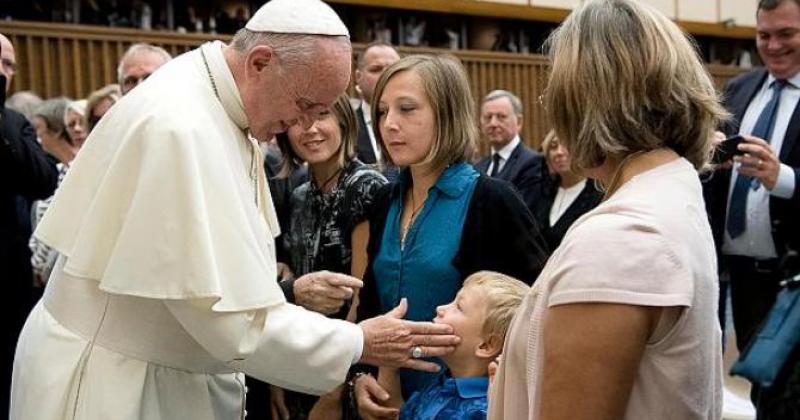Francis received victims’ relatives on Saturday, September 24: it is not with hatred and violence that we should respond to the Devil’s attacks but with forgiveness, love and respect towards others, regardless of whether they are different from us.
There may be many of them but they all deserve at least one caring caress from the Pope. There are some smiles as Francis walks by greeting them, embracing them, looking at them with a comforting and encouraging expression in his eyes. Not when he touches the photo of one of the victims, which some relative or other desperately clings onto. Only when he looks up for a moment at the guests gathered for the audience. “I am deeply moved to be meeting you, who are going through physical or mental suffering as a result of the blind violence unleashed against you or one of your loved ones on an evening of celebration, regardless of your nationality or religion.” Pope Francis addressed these words to a delegation from the French city of Nice who met him in the Nervi Hall in the Vatican. The delegation comprised relatives of the victims (86 dead and 302 wounded) of the terrorist attack which took place on 14 July this year on the Promenade des Anglais. He asked them not to respond to hatred with more hatred but with dialogue.
Around 1.000 people gathered in the Paul VI Hall, including the mayor of Nice, Christian Estrosi and the bishops, Mgr. André Marceau. The meeting was deeply meditative and moving occasion. There were also Muslim and Jewish representatives present.
“I wish to share in your pain, a pain that is even more acute when I think of the children, or even entire families, whose lives were suddenly ripped away from them in such a dramatic manner,” the Pope said. “I assure each and every one of you of my compassion, closeness and prayers.”
“I also pray to the merciful God for all those who are wounded, in some cases suffering terrible mutilation either in the flesh or in spirit and I have not forgotten all those who were unable to be here for that very reason or who are still in hospital,” the Bishop of Rome said.
The Church “remains close to you and accompanies you with immense compassion. As it stands my you in these difficult moments, it asks the Lord to help you and instil sentiments of peace and fraternity in your hearts.”
The tragedy experienced by the city of Nice has sparked significant gestures of solidarity and support,” Francis emphasised. “I thank all those who immediately came to the victims’ rescue or who have until now - and certainly for a long while to come – been devoting their time to supporting and guiding families.”
“Naturally,” the Pope was thinking of “the Catholic community and its bishop, André Marceau, but also of the support services and the various associations , especially the Alpes-Maritimes Fraternité association that is present here today, which brings together representatives of all religious denominations and this is a beautiful sign of hope.”
The Pope was glad “to see that there are vibrant interreligious relations among you” because “this will undoubtedly help heal the wounds causes by these tragic events”.
He then sent out a heartfelt appeal: “Establishing sincere dialogue and fraternal relations among all, especially those who believe in one merciful God is an urgent priority that leaders, both politicians and religious figures, must seek to foster and which each and everyone of us is called to put into practice.” When “the temptation to retreat into one’s shell or respond to hatred with more hatred and to violence with more violence is great, then an authentic conversion of the heart is necessary”.
This is “the message that Jesus’ Gospel addresses to us,” the Pope explained. “We can only respond to the Devil’s attacks with the works of God, namely, forgiveness, love and respect for others, regardless of whether they are different from us.”
Francis also prayed “for your dear country and its leaders, that they may work tirelessly to build a just, peaceful and fraternal society”.
Relatives of the Nice victims presented the Pope with a basket containing 86 flowers: "86 stands for the number of loved ones who died and all the different colours represent us. On behalf of people of all faiths, they express our gratitude, appreciation and collective affection better than a bunch of words," Estrosi said.
